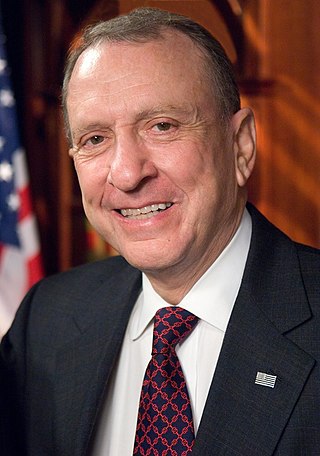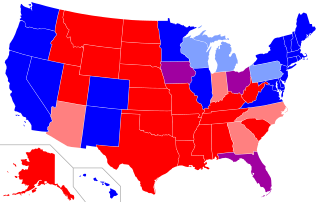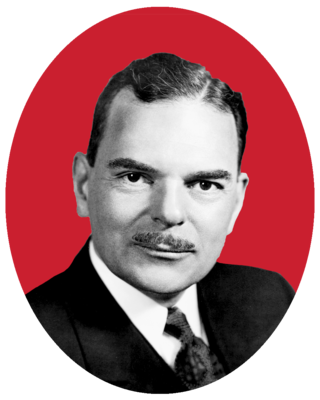Federal Republican Party may refer to:
Federal Republican Party may refer to:

The politics of the United States function within a framework of a constitutional federal republic and presidential system, with three distinct branches that share powers. These are: the U.S. Congress which forms the legislative branch, a bicameral legislative body comprising the House of Representatives and the Senate; the executive branch which is headed by the president of the United States, who serves as the country's head of state and government; and the judicial branch, composed of the Supreme Court and lower federal courts, and which exercises judicial power.

The Libertarian Party (LP) is a political party in the United States that promotes civil liberties, non-interventionism, laissez-faire capitalism, and limiting the size and scope of government. The party was conceived in August 1971 at meetings in the home of David F. Nolan in Westminster, Colorado, and was officially formed on December 11, 1971, in Colorado Springs, Colorado. The organizers of the party drew inspiration from the works and ideas of the prominent Austrian school economist, Murray Rothbard. The founding of the party was prompted in part due to concerns about the Nixon administration, the Vietnam War, conscription, and the introduction of fiat money.

The Republican Party, also referred to as the GOP, is one of the two major contemporary political parties in the United States. The GOP was founded in 1854 by anti-slavery activists who opposed the Kansas–Nebraska Act, which allowed for the potential expansion of chattel slavery into the western territories. It has been the main political rival of the Democratic Party since the mid-1850s. Like them, the Republican Party is a big tent of competing and often opposing ideologies. Presently, the Republican Party contains prominent conservative, centrist, populist, and right-libertarian factions.
Republican can refer to:

Ronald Ernest Paul is an American author, activist, physician and retired politician who served as the U.S. representative for Texas's 22nd congressional district from 1976 to 1977 and again from 1979 to 1985, as well as for Texas's 14th congressional district from 1997 to 2013. On three occasions, he sought the presidency of the United States: as the Libertarian Party nominee in 1988 and as a candidate for the Republican Party in 2008 and 2012.

Arlen Specter was an American lawyer, author and politician who served as a United States Senator from Pennsylvania from 1981 to 2011. Specter was a Democrat from 1951 to 1965, then a Republican from 1965 until 2009, when he switched back to the Democratic Party. First elected in 1980, he was the longest-serving senator from Pennsylvania, having represented the state for 30 years.
Republican Party is a name used by many political parties around the world, though the term most commonly refers to the United States' Republican Party.

Starting with the 2000 United States presidential election, the terms "red state" and "blue state" have referred to U.S. states whose voters vote predominantly for one party — the Republican Party in red states and the Democratic Party in blue states — in presidential and other statewide elections. Examining patterns within states reveals that the reversal of the two parties' geographic bases has happened at the state level, but it is more complicated locally, with urban-rural divides associated with many of the largest changes.

The 1996 Democratic National Convention was held at the United Center in Chicago, Illinois, from August 26 to August 29, 1996. President Bill Clinton and Vice President Al Gore were nominated for reelection. This was the first national convention of either party to be held in Chicago since the disastrous riots of the 1968 Democratic convention, and as of 2020, the most recent presidential convention held in the city by either major party.

The 1948 Republican National Convention was held at the Municipal Auditorium, in Philadelphia, Pennsylvania, from June 21 to 25, 1948.

The West Virginia Republican Party is the affiliate of the United States Republican Party in West Virginia. Elgine McArdle is the party chair. It is currently the dominant party in the state, controlling all both of West Virginia's U.S. House seats, one of the U.S. Senate seats, both houses of the state legislature, and the governorship.
The Republican Party of Australia was a minor Australian political party dedicated to ending the country's monarchy and establishing a republic. It was formed in 1982 and registered by the Australian Electoral Commission on several occasions prior to being voluntarily deregistered in 2021. It was not linked with the Australian Republic Movement.

The Chuck Baldwin presidential campaign of 2008 began April 10, 2008 as pastor and radio host Chuck Baldwin of Florida announced his candidacy for the Constitution Party presidential nomination. He previously served as the party's vice-presidential nominee in 2004. Baldwin's main opposition for the nomination was former ambassador Alan Keyes, who had just left the Republican Party. After a campaign touting his stands on civil liberties, foreign affairs, and religion, Baldwin won the nomination at the April 26 Constitution Party National Convention. Attorney Darrell Castle was selected as his running mate.
The following is a timeline of major events leading up to the United States presidential election of 2012. The election was the 57th quadrennial United States presidential election and was held on November 6, 2012.

The 2010 United States House of Representatives elections in Massachusetts were held on November 2, 2010, to determine who would represent the state of Massachusetts in the U.S. House of Representatives. Massachusetts has ten seats in the House, apportioned according to the 2000 United States Census. Representatives are elected for two-year terms; those elected will serve in the 112th Congress from January 3, 2011 until January 3, 2013. All current representatives are member of the Democratic Party and none of the ten faced major party opposition in 2008.

The Ron Paul presidential campaign of 1988 began in early 1987 when former Congressman Ron Paul of Texas announced his candidacy for the 1988 presidential nomination of the Libertarian Party. He joined the third party after leaving the Republican Party over the Reagan administration's handling of the federal budget. He ran on a platform that included non-interventionism in foreign conflicts, decriminalization of illegal drugs on a federal level, a return to the gold standard, the abolition of the Federal Reserve and a reduction in all government spending.

The 2018 South Dakota gubernatorial election took place on November 6, 2018, to elect the next governor of South Dakota. Incumbent Republican governor Dennis Daugaard was term-limited and could not seek re-election to a third consecutive term.
Colorado Republican Federal Campaign Committee v. FEC, 518 U.S. 604 (1996), was a case heard by the Supreme Court of the United States in which the Colorado Republican Party challenged the Federal Election Commission (FEC) as to whether the "Party Expenditure Provision" of the Federal Election Campaign Act of 1971 (FECA) violated the First Amendment right to free speech. This provision put a limit on the amount of money a national party could spend on a congressional candidate's campaign. The FEC argued that the Committee violated this provision when purchasing a radio advertisement that attacked the likely candidate of the Colorado Democratic Party. The court held that since the expenditures by the Committee were made independently from a specific candidate, they did not violate the campaign contribution limitations established by the FECA, and were protected under the First Amendment.

The 2020 Libertarian Party presidential primaries and caucuses were a series of electoral contests to indicate non-binding preferences for the Libertarian Party's presidential candidate in the 2020 United States presidential election. These differ from the Republican or Democratic presidential primaries and caucuses in that they do not appoint delegates to represent a candidate at the party's convention to select the party's presidential nominee.

The 2022 Minnesota State Auditor election was held on November 8, 2022, to elect the state auditor of the U.S. state of Minnesota. Incumbent DFLer Julie Blaha won re-election to a second term.